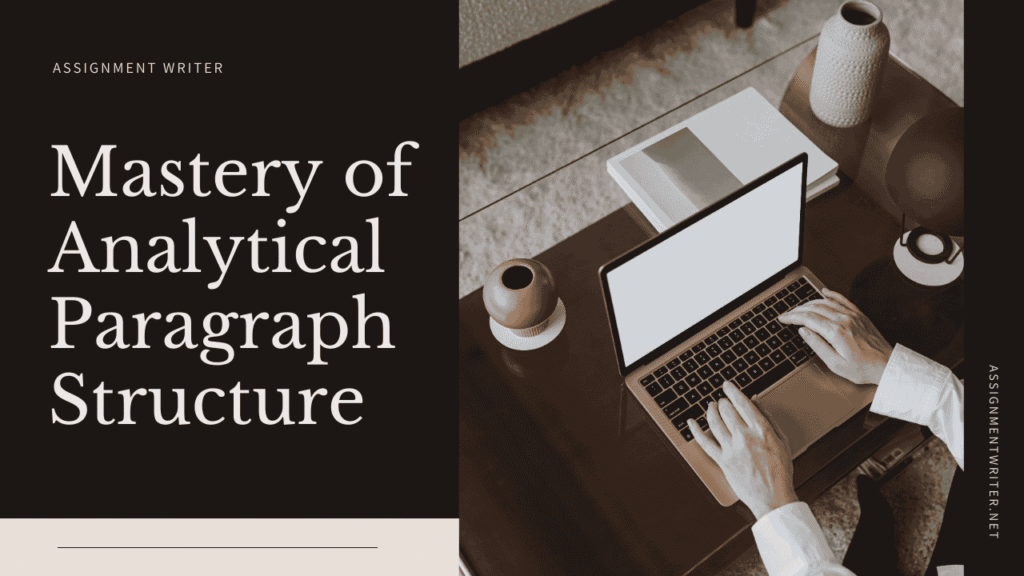Refine Your Writing with Analytical Paragraph Structure
Table of Contents
Toggle
Every insight is a path towards a discovery; every discovery demands an observation. That observation leads to analysis. An analysis is more than a set of sentences; it is a developed unit of thought that establishes connections, interprets meaning, and examines evidence. An analytical paragraph structure performs best.
Topic Sentence: Your Helpful Guide
The very first topic sentence sets the foundation for the rest of the paragraph. It introduces the main idea and helps you follow the next sentences. An effective choice of words shapes a specific, concise, and clear expression—there remains no doubt about the message of the paragraph.
The characteristics of a good topic sentence include analytical edge, specificity, and clarity. What does it mean? Avoid vagueness, show that you do not just offer a summary but a guide as well, and narrow the interpretation so your message is not lost. This is a valuable approach for a paragraph peel.
Evidence with Introduction and Context
Before you step into an analysis, you must make sure that the context is laid out properly. Make the point in a way that leaves no room for doubt for your reader. The process involves explaining a point, establishing a setting, or setting up your overall argument for the broader stage of a scholarly discourse.
How do you present your evidence? It can be presented in the form of concrete details, historical facts, statistical data, and textual quotations. Another thing that you need to make sure of is that your evidence must contain variety, sufficiency, and relevance. If your evidence is confusing, then it kills the whole point.

Analysis: Underneath the Surface Exploration
Analysis is an opportunity that you need to avail. It shows how and why evidence backs up your non-fiction or fiction text. In academic writing – or any other kind of analytical writing – this is arguably the most difficult part of the paragraph. A good analysis transitions simple evidence into meaningful commentary.
The aspects that you should consider when delivering evidence are connections, angles, and technical vocabulary. It builds the authoritativeness of your work and adds weight to the argument you are making.
Transitioning and Linking: Introduction and Conclusion
An analytical paragraph neither has a forceful introduction nor has an abrupt conclusion. Your first sentence and last sentence help the reader understand your entire work. Support your argument with multiple pieces of evidence and your transitions between sentences should flow well.
Even a different point should link back to your central argument. Whether it is a thesis statement, an essay, an assignment, or a random argument, these examples of analytical writing are universal and can be applied to any piece of writing.
Pitfalls to Avoid to Maintain Key Points in the Text
A reader should be able to understand the writer’s purpose. There are some components that you need to demonstrate to achieve that. You need to take care of pitfalls in the way of your progress; about time you paid attention to them.
Prioritizing Summary
Remember: an analysis is not a summary. Your writing intends to analyze a particular topic, not to offer a briefing. Your analysis should cover most of your paragraph, such as 60-70% of the work. Less or more than that percent would not fit your work well.
Adding Baseless Quotes
Quotes strengthen your analysis for sure. The point to ponder is not to add irrelevant quotes or to add quotes without context. Do not drop in a random saying without establishing its background first. Quotes are a reliable element of evidence to support your claim.
Long Sentences
Do not turn a single sentence into a whole paragraph. Keep your sentences short, sensible, and strong. This is how you structure an analytical essay, assignment, thesis, or any other piece of work. Do not make the mistake of thinking it is just one paragraph; a paragraph can make or break your whole paper.
Weak Flow
Your sentences should not feel forced or rushed. A strong flow is one of the basic signs of professionalism in writing. If your approach towards sentences is abrupt, then it is not a good sight for the reader, which means it is not a good result for you. Whether you are writing a GCSE exam or answering an essay question, this bit is relevant for every format.
Mastery of Analytical Paragraph Structure
Some good tips can help you write an analytical paragraph at the highest level.
Make an Outline
This is more important than you think. Write down all the necessary items that should be in your paragraph. This is how you will not forget anything and everything of importance will be covered.
Professional Precision
Tone, connotation, and diction are what should grab your attention. After all, you are writing; you should be proficient in the language you are writing in. If you sound like an amateur in writing, then your work will immediately be disqualified.
Link Thematically
Paragraphs should flow into each other thematically. It should reinforce your point well; evidence supports your paragraphs practically, and this is where links play a vital role. If you do not link the right way, then all of this effort is meaningless.
Revise Well
You are your own biggest critic. Once you have written the paragraph, it is time to revise and be ruthless about it. It is better to highlight your mistakes than to have your professors point them out for you.
Read Examples
You may read samples and similar work to find out how it is done. Gather published data, observe it well, and try to incorporate their techniques that have made those papers successful.
Conclusion
Analytical paragraph structure is supportive of your analytical writing. Once you have implemented this structure in your writing, nearly all of your problems are over. On the other hand, it is difficult to achieve analytical writing tasks if you do not adopt the structure and go your separate way.
Search
Recent Post
Categories
No Plagiarism | No AI A+ Grade Guaranteed


